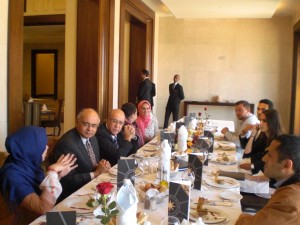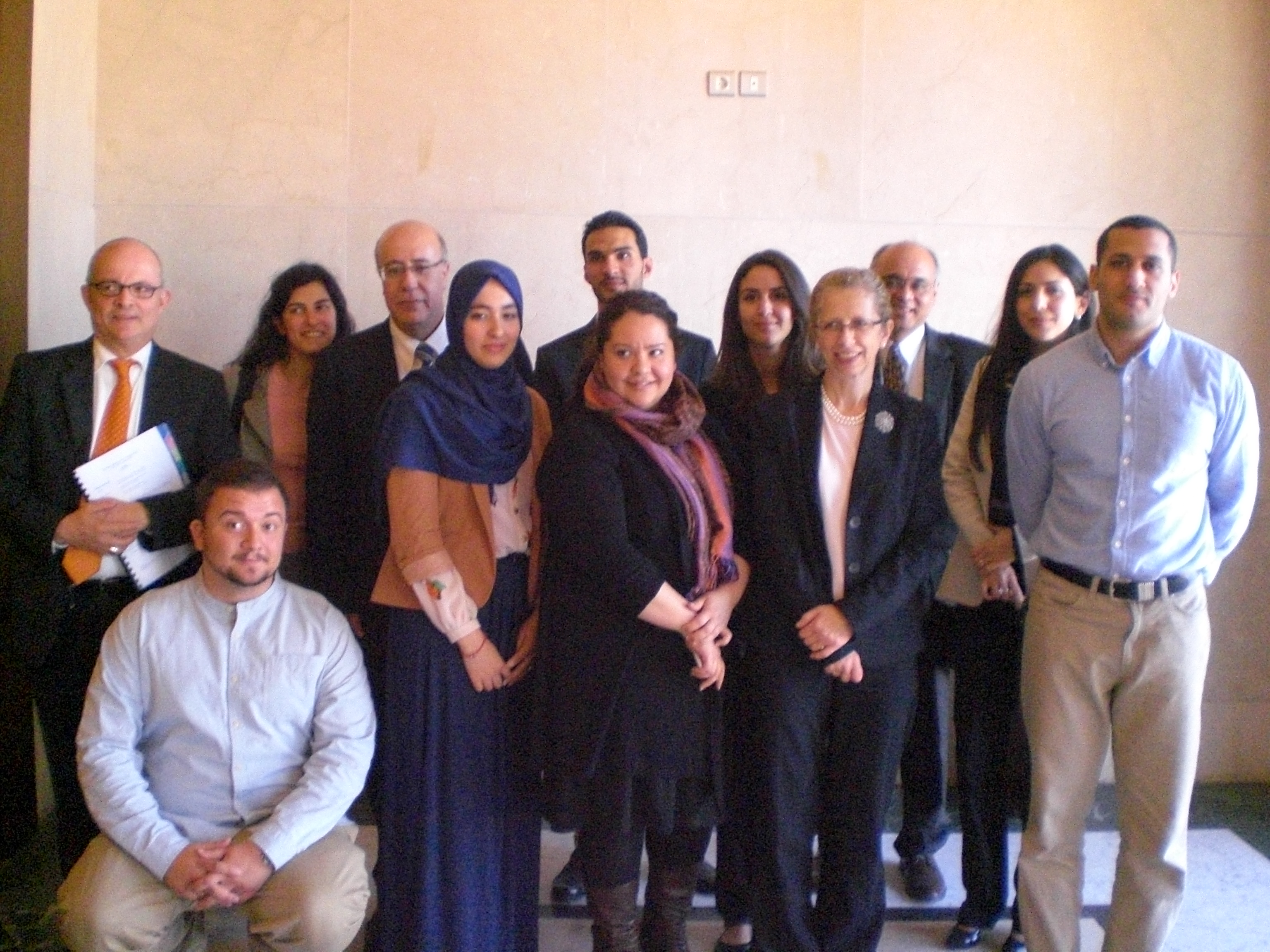By: Nihal Zaroug.

Tripoli, 9 April 2013:
In an attempt to reach out to a wider group of civil society organisations . . .[restrict](CSOs) in Libya, the World Bank held a luncheon at Tripoli’s Waddan Hotel, on 7 April.
The event took place on the occasion of the Bank’s Middle East and North Africa (MENA) Vice President, Inger Andersen’s visit to Libya, accompanied by Simon Gray, Maghreb Department Director, and Junaid Ahmad, MENA Sustainable Development Department Director.
Andersen congratulated Libya, on “the extraordinary accomplishment, that delivered unbelievable freedom” to its people, and was eager to hear about the country’s more recent successes and challenges. Of particular interest to the her was the civil society group’s level of optimism for the future.
The common response was a positive outlook for Libya’s democratic transformation. The attendees asserted that barriers existed, however they believed them to be transient and part of the post-conflict emergence of a new state.
In attendance were also the World Bank Libya’s Resident Representative, Marouane El Abassi, Lead Economist, Nada Choueiri, and representatives Hind Irhiam, and Mirah Hussein.
Ahmad told guests that Libya had significant regional impact and hence discussions would focus on ‘how best to support Libya in its transition”. The Bank’s recent activities in Libya include stolen assets recovery and the prospects of lending technical expertise to the public sector .

Over the years, the Bank has considerably re-evaluated its development strategies, and CSOs have become major actors in the implementation of the Bank’s direct and indirectly funded programmes. Ahmad stated, Libya was in a unique position, as he considered it “ground zero for CSOs”, and hence a main area of support would be in capacity building.
It is the experience and knowledge of local civic groups that could shed light on the country’s short and long-term needs, and provide information to assist the Bank in determining its function in Libya. Bringing CSOs together, said Al Abassi, was beneficial to all sides.
The groups invited for talks embody a diverse set of needs and stakeholders. However the most pressing issues discussed included education, health care, program funding, job creation and training.
The accountability and capabilities of Libya’s leadership was also raised. Security breaches, delays in the drafting of the constitutions, national reconciliation, and shortcomings of the public sector, were viewed as major obstacles needing drastic solutions.
Fuad Gritli, a radio talk show host at Radio Zone, simplified matters. From his day-to-day conversations with Libyans, he gathered that most were concerned with salaries and “getting married”. As lighthearted as his interjection seems, this is a real issue tied to lack of housing, jobs and the high costs associated with nuptials. To encourage marriages, a law was passed last year, under which, a marriage support fund was created by the Ministry of Social Affairs.
A shared focus among all the CSOs, is the country’s youth. By some estimates for 2013, the age group 15-24 years old represents close to 19 percent of the population. This demographic receives little focus from the government, and civic engagement is seen as the best way to push their interests forefront. In the absence of government initiatives, the projects undertaken by the CSOs look to fill the void and meet requirements of the youth group.
Be Positive, represented by Esra Abudaya, is a newly established non-governmental organization (NGO) with plans to initiate a youth-to-youth peer education and activist network.
The Libyan Youth Forum (LYF), represented by Abdulrahman Alajeli, is a coalition formed to unite youths and youth groups across the country, and includes the Libyan Youth Movement (LYM/Shabab Libya) and Libya Link. The organisation is well-known and supports several civic initiatives and humanitarian campaigns on the ground.
LYM’s Libyan Youth Voices, a recent joint project with the International Political Forum (IPF), is a platform designed to air Libyan-authored interviews, stories, opinion pieces and artistic expressions. It also provides an opportunity for the country’s young people to describe their hopes and dreams for the future, whilst challenging negative media portrayals of the country’s youth.
H2O Team, represented by Ala Elganbur, is also a youth-based NGO located in Tripoli, with plans to establish a secondary workplace in Bengahzi. The group recently completed Des-Tour, a constitutional awareness campaign aimed at informing the public and creating debate on the upcoming constitution drafting process. In total 75 towns were visited and surveyed. Information gathered will be presented to the General National Congress (GNC) and Government, in an attempt to ensure youth demands are taken into account in the new charter. The team is involved with several other projects such as “Eye on the GNC”, “Active Citizen” and “Internet for All”.
Other groups sharing their insights, were 1Libya, represented by Hiba Khalil, and Wafa Relief Libya, represented by Nusaiba Jalal.
1Libya advocates for independent media and has organised a photojournalism program, and is currently involved with the Libyan Movie Awards. The NGO has also undertaken various civic awareness campaigns, and is presently promoting “Min Hagek: It is Your Right”, a women’s rights campaign that aims to empower women and promote positive change.
Wafa Relief was established as a humanitarian aid organisation distributing provisions to displaced individuals and helping the war-wounded. Post-revolution, it has re-organised its operations to focus on human development, and is currently working to deliver psychiatric care and family counseling to those affected by the war.
[/restrict]






